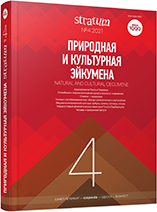Легенда о Гикии, Станислав Сестренцевич-Богуш и Екатерина II
The Legend of Gycia, Stanislas Sestrencewicz-Bohusz, and Catherine II
Author(s): Nikita I. KhrapunovSubject(s): History, History of ideas, 18th Century
Published by: Издательский дом Stratum, Университет «Высшая антропологическая школа»
Keywords: Crimea; Stanislas Sestrencewicz-Bohusz; history of research; Russian state ideology; Chersonesan-Bosporan wars;
Summary/Abstract: This article analyses the reasons which made Stanislas Sestrencewicz-Bohusz (Siestrzeńcewicz-Bohusz, also Sestrentsevich or Sestrenzewitsch, 1731—1826) to study the history of the Crimea and to write one of the first monographs on the subject, which still determines some trends in the Crimean studies. It has been shown that Sestrencewicz, the head of Catholic church in Russia, who tried to establish normal relations between the Polish elite and the Russian government after the first partition of Rzeczpospolita, composed a verse drama of the story of the relations between Chersonesus and Bosporus as described in the 53rd chapter of De administrando imperio by Constantine Porphyrogenitus. Sestrencewicz supplied the main character of his drama, Gycia by name, with well-recognizable traits of Catherine II and put up the idea of the necessity of peaceful cooperation between the Chersonesites (Russians) and Sarmatians (Poles). It has been supposed that the ideas embodied in the drama made Catherine II and her favorite Grigorii Potemkin to order Sestrencewicz to write the history of the Crimea. After the unification of the Crimea with Russia in 1783, the writing of its history became a matter of public importance. Sestrencewicz knew ancient languages and therefore could read sources in original. His sincere pro-Russian position appeared in his interpretation of the liquidation of the khanate as the end of the Crimean history. The events in Sestrencewicz’s creative biography are uncovered against the background of the Russian state ideology and the ideas of Enlightenment about the history of the Crimea.
Journal: Stratum plus. Археология и культурная антропология
- Issue Year: 2021
- Issue No: 4
- Page Range: 321-331
- Page Count: 11
- Language: Russian
- Content File-PDF

